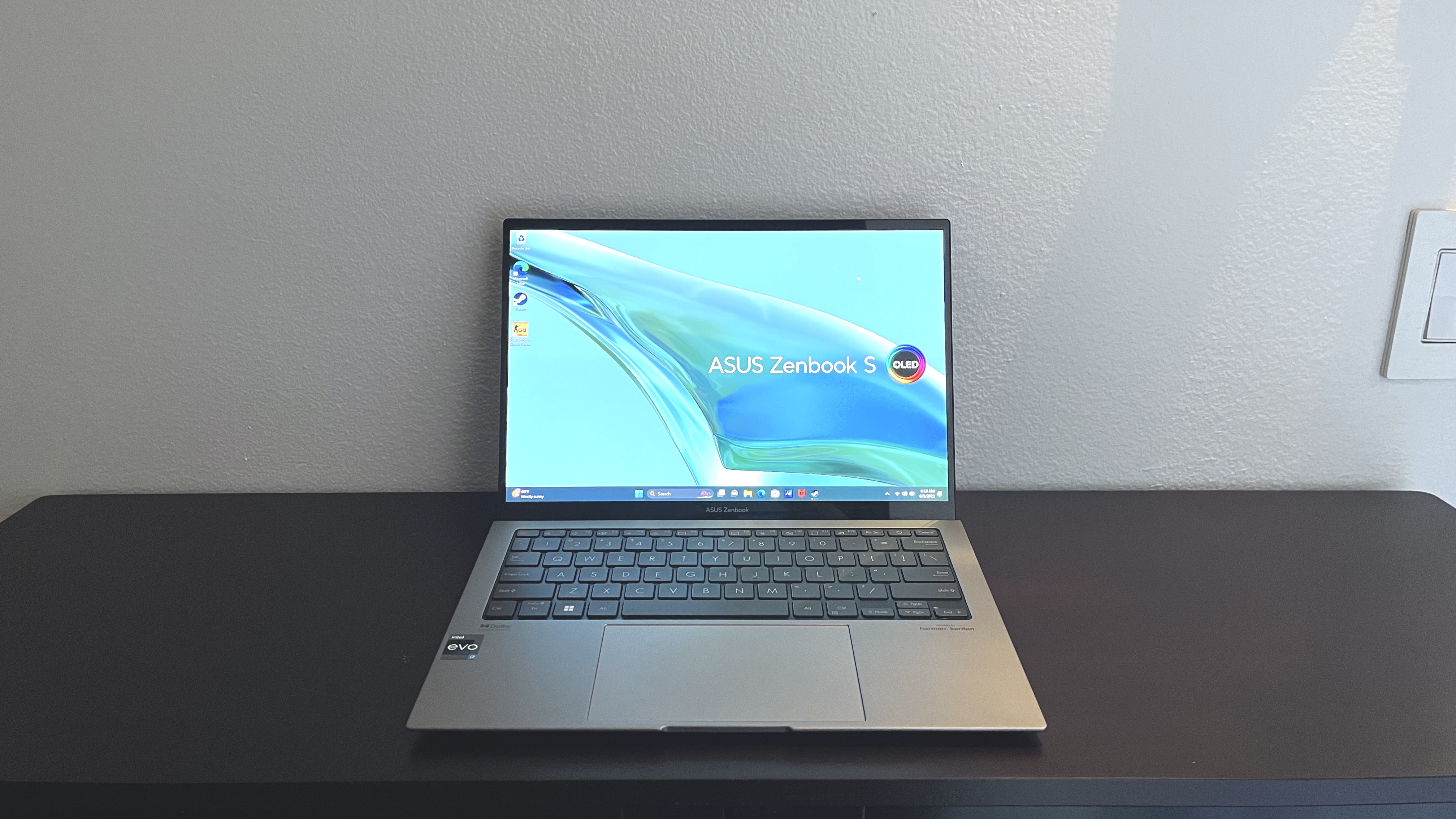
Asus Zenbook S 13 OLED (2023): One-minute review
I could spend a lot of time talking about how eco-friendly the Asus Zenbook S 13 OLED is. I could talk extensively about how for something that even looks and feels unique, its one-of-a-kind lid is surprisingly made using an “environmentally low-impact method” . Or, I could spend some time on how the recyclable packaging can be repurposed into a laptop stand.
But, the Asus Zenbook S 13 OLED (2023) is more than a gimmick aimed at those worried about climate change. It’s actually a fantastic computer worthy of your attention even if all you care about is getting something portable yet powerful. It may be among the best laptops of the year. It certainly belongs among the best Ultrabooks.
Just like most of the top Ultrabooks out there, the Asus Zenbook S 13 OLED delivers in the portability department. It’s small enough that I didn’t believe it was a 13-inch computer when I first opened it up. It’s fairly lightweight as well, though it does have some heft to it compared to other Ultrabooks. And, within this small chassis, Asus has somehow managed to pack quite a powerful punch. No easy task considering there’s not a dedicated GPU here.
As is typical with Ultrabooks, unfortunately, the speakers are thin and lacklustre. That trackpad can also be a little too sensitive – though that’s a bit of a nitpick. And, though Asus is known for its affordability, the Zenbook S 13 OLED (2023) is not cheap, equipped with a higher price tag than the base 13-inch MacBook Pro.
But, considering everything that this little demon can do, it’s worth it.
Asus Zenbook S 13 OLED (2023): Price & availability
- How much does it cost? $1,399.99 / £1,499.99 / AU$2,099.00
- When is it available? Available now
- Where can you get it? Available in the US and Australia
The current configuration of the Asus Zenbook S 13 OLED (2023) is pricey, coming in at $1,399.99 / £1,499.99 / AU$2,099.00. However, it’s worth the price, even if it’s higher than we might expect from a company like Asus that balances performance with value.
A base model of the 13-inch MacBook Pro with an M2 chip goes for $1,299 / £1,299 / AU$1,999. That configuration does come with 8GB to the Asus’ 32GB and updating the Macbook to its highest level of available RAM (24GB) adds an additional $400 / £400 to that price tag. With that in mind, the Asus Zenbook S 13 OLED's premium price tag seems pretty fair.
That said, there are more affordable OLED laptops out there. Just consider the Acer Swift 3 OLED, which starts as low as $930 / around £808 / AU$1,382. Of course, that comes with a 12th-gen i5 and 8GB of RAM but you still get a gorgeous OLED display. Plus, as much power as the Asus Zenbook S 13 OLED has, it’s still not really a gaming laptop so most people comparing these two laptops probably won’t care as much about the difference in performance.
At the time of writing, the review version of the Asus Zenbook S 13 OLED (2023), specifically the model # UX5304VA, with its Intel Core 13th-gen i7 and 32GB of RAM is not available in the UK. However, it should be available on the Asus eShop at the end of June and on Curry’s in early July.
Also of note, though the landing page for the configuration reviewed here lists different configurations, only the one reviewed here seems to be available. Hopefully, that will change soon.
- Value: 4 / 5
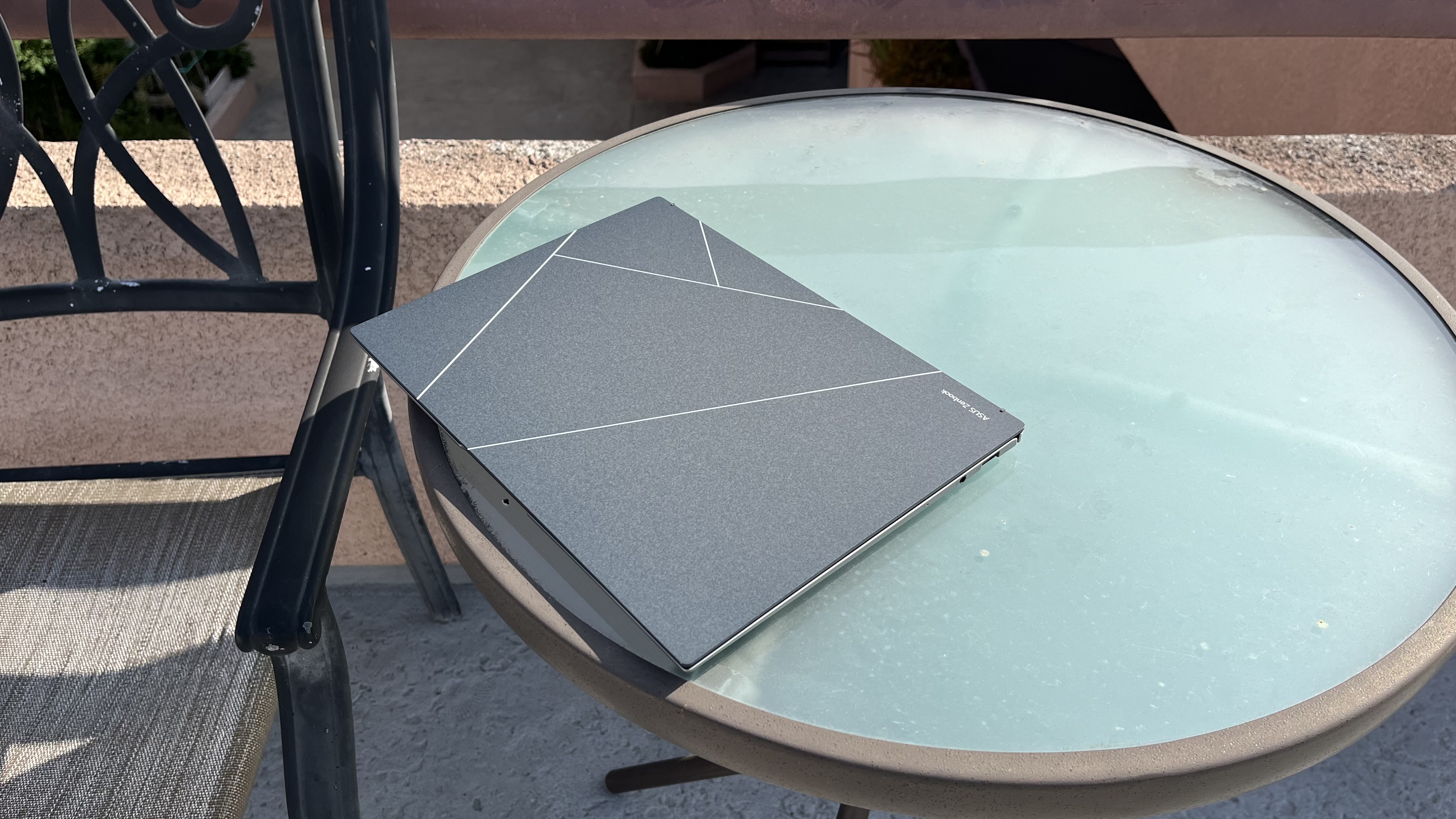
Asus Zenbook S 13 OLED (2023): Specs
The Asus Zenbook S 13 OLED (2023) comes in just one configuration at the moment, though that might change in time.
Asus Zenbook S 13 OLED (2023): Design
- Unique laptop lid is tip of the eco-friendly iceberg
- 25% thinner than its predecessor
- Great keyboard and solid if sensitive trackpad
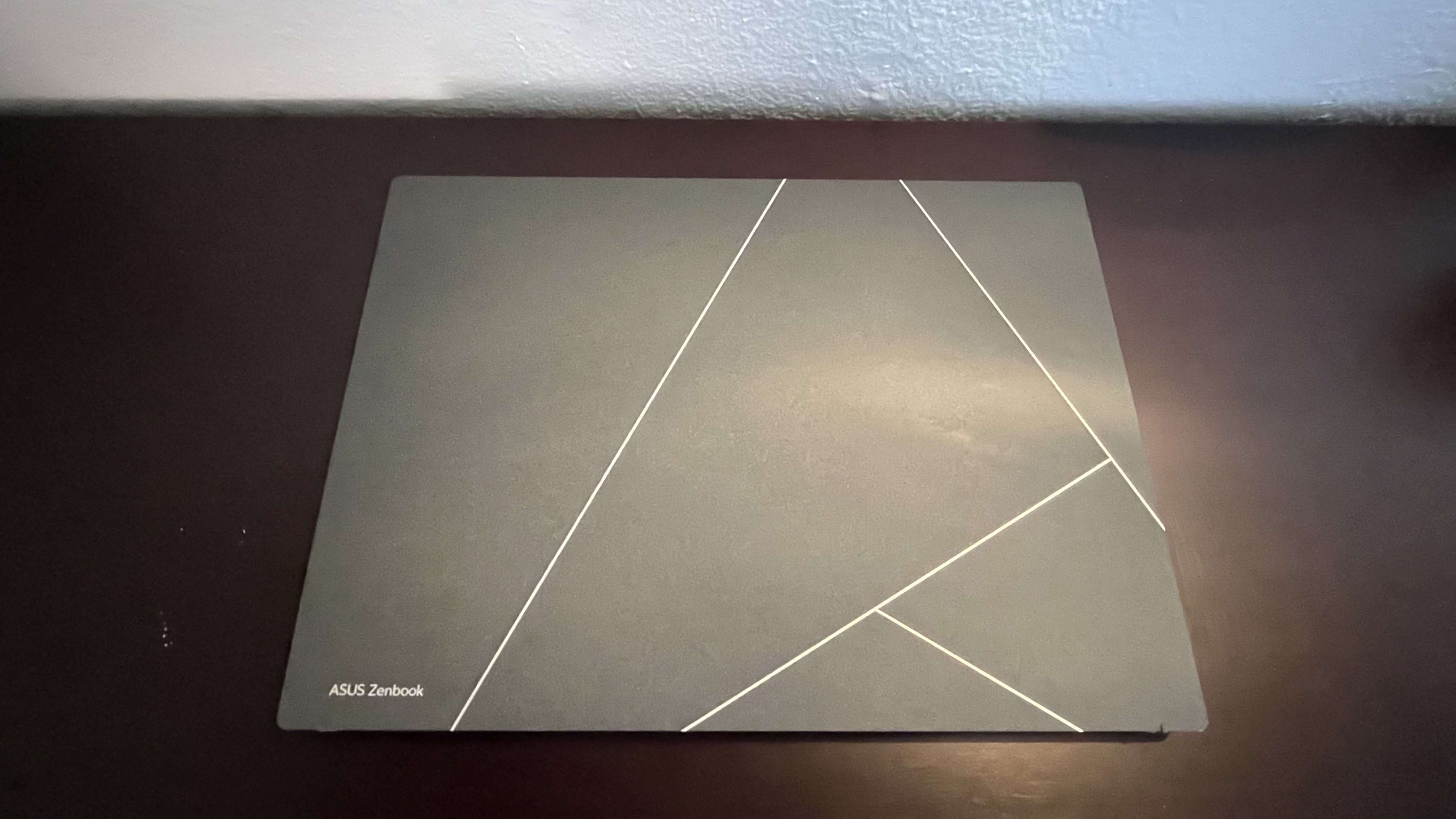
Though there are a lot of eco-friendly aspects to this laptop, I’ll just touch on a few. The laptop lid, which corresponds with one of two colorways: Basalt Gray and Ponder Blue, is probably the most visible aspect of the Asus Zenbook S 13 OLED (2023)’s more sustainable approach. Instead of a brushed aluminum lid that’s become de rigueur since Apple started the trend, the one protecting this computer is made of plasma ceramic aluminum, which uses a lower-impact production method and is recyclable at the end of the laptop’s lifetime.
The lid is unique beyond just its line-stricken appearance and lower carbon footprint. Not only does it come in a color I’m not used to seeing on a laptop – the model Asus sent for review was in Basalt Gray – but the texture is a bit rougher, almost like it’s made of rock.
A much less conspicuous element of the Asus Zenbook S 13 OLED (2023)’s sustainability is courtesy of its size. Not only is it 25% smaller than its predecessor but its internals are custom-made to take up less space and use fewer materials. Plus, when closed, it’s less than half an inch thick. You can probably attribute its light weight of 2.20lbs / 1kg to its thoughtful construction.
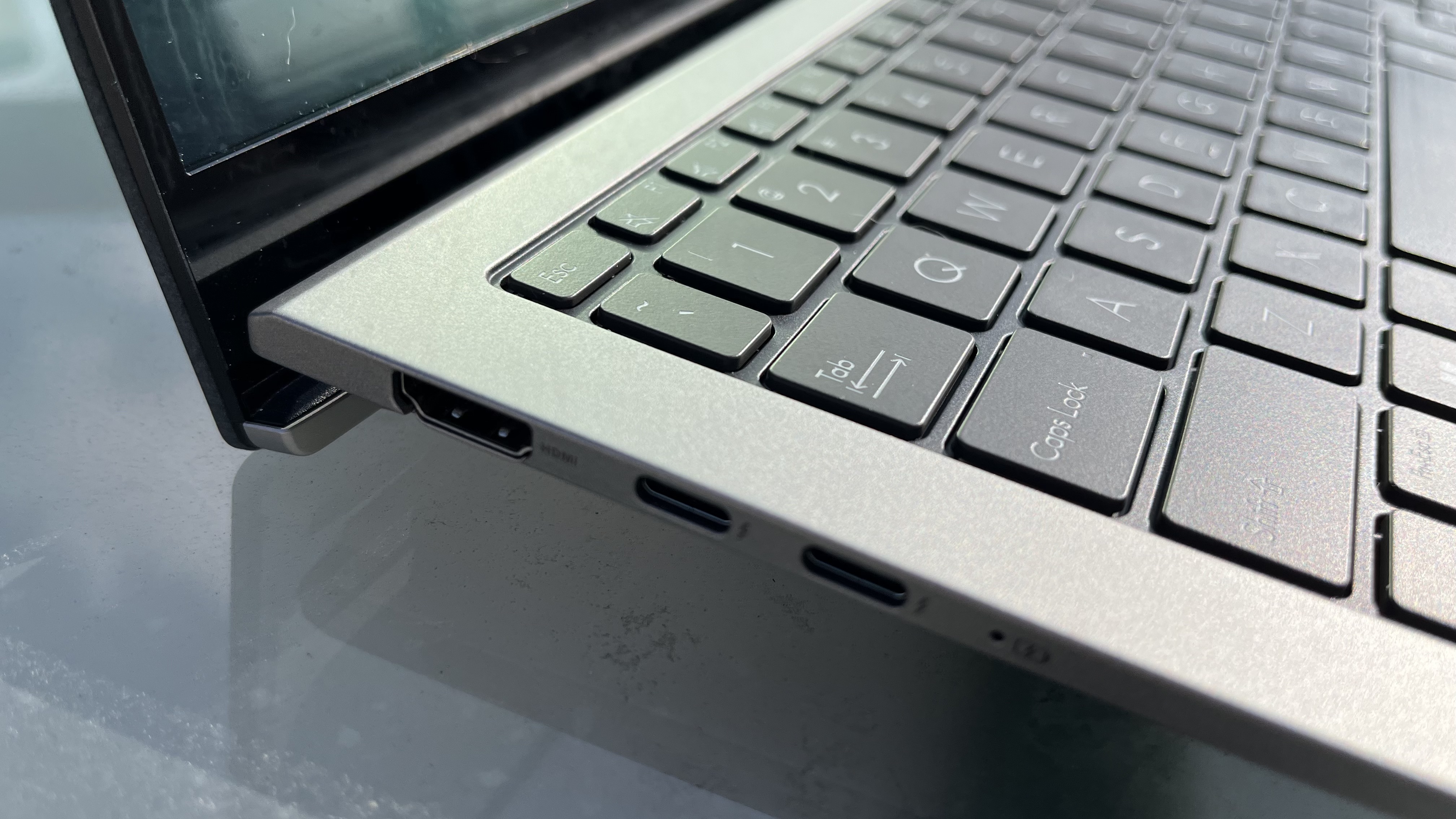
Beyond these sustainability-related design choices, there’s plenty else to get excited about. When you open the lid, the bottom actually raises the bottom chassis for more ergonomic access to the keyboard. And, though this isn’t a 2-in-1, the hinge has a 180-degree articulation so that you can lay it flat showing off that 13.3-inch OLED panel in a group setting. Just don’t do it outside as there is a bit of glare to that screen.
The port selection is another point in the Asus Zenbook S 13 OLED (2023)’s favor as it’s pretty robust for an Ultrabook, coming with two USB-C ports, an HDMI port, and a USB-A port, not to mention a headphone jack. That’s pretty impressive considering this laptop’s size. If there’s anything to complain about here, it’s the fact that both USB-C ports are on the same side.
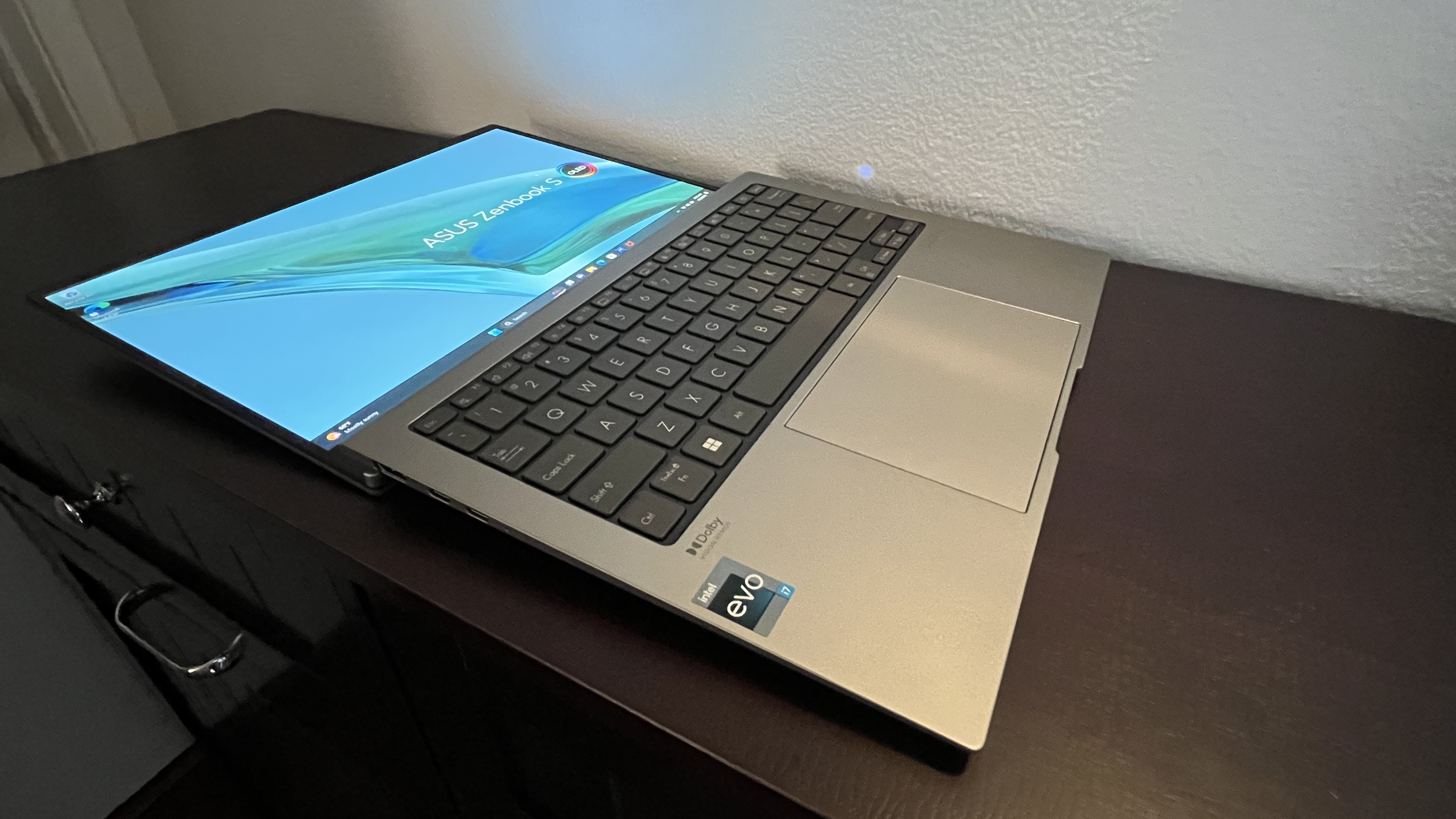
With a 1.1mm travel, I found the keyboard to also be well thought out. If you’re coming from the world of mechanical and gaming keyboards, you’ll have to adjust as you won’t have the amount of travel you’re used to. However, the keyboard is fast and accurate with enough space between the keys that I don’t typically make many mistakes when using it.
The trackpad is a little less stellar, though still quite good. What I mean by that is that it’s plenty wide with accurate tracking, but it can be a little too sensitive. I’ve found myself accidentally highlighting some text because my left hand was a little too close to that trackpad while I was navigating it with my right. It’s far from a dealbreaker, but it’s worth being aware of.
- Design: 4.5 / 5
Asus Zenbook S 13 OLED (2023): Performance
- Gorgeous OLED screen
- Lots of power for an Ultrabook
- Speakers are thin
Here's how the Asus Zenbook S 13 OLED (2023) performed in our suite of benchmark tests:
3DMark: Night Raid: 14,315; Fire Strike: 4,149; Time Spy: 1,524
GeekBench 6: 2194 (single-core); 7727 (multi-core)
Handbrake 1.6: 18 minutes 51 seconds
CrossMark: Overall: 1425 Productivity: 1379 Creativity: 1541 Responsiveness: 1243
Sid Meier's Civilization VI: Gathering Storm: 45.88 fps
PCMark 10 Battery Life: 12 hours and 7 minutes
Using the Asus Zenbook S 13 OLED (2023) is a pleasure. As it’s in the name, let’s start with that 13.3-inch gorgeous OLED screen. Not only is it a higher resolution (2880 x 1800) with a 16:10 aspect ratio for a little extra screen real estate, but it has 550 nits of brightness as well as Vesa Certified Display HDR True Black 500.
Whether I’m watching Wednesday on Netflix, looking up travel photos, or trying to play a game, everything looks crisp and vibrant. Its 100% DCI-P3 color gamut is also to thank for that, which is wide enough for some light photo editing. A quick note on that HDR… it’s not quite that game-changing level of HDR but it looks good. And, unlike some basic versions, you won’t get that washed-out effect when turning it on.
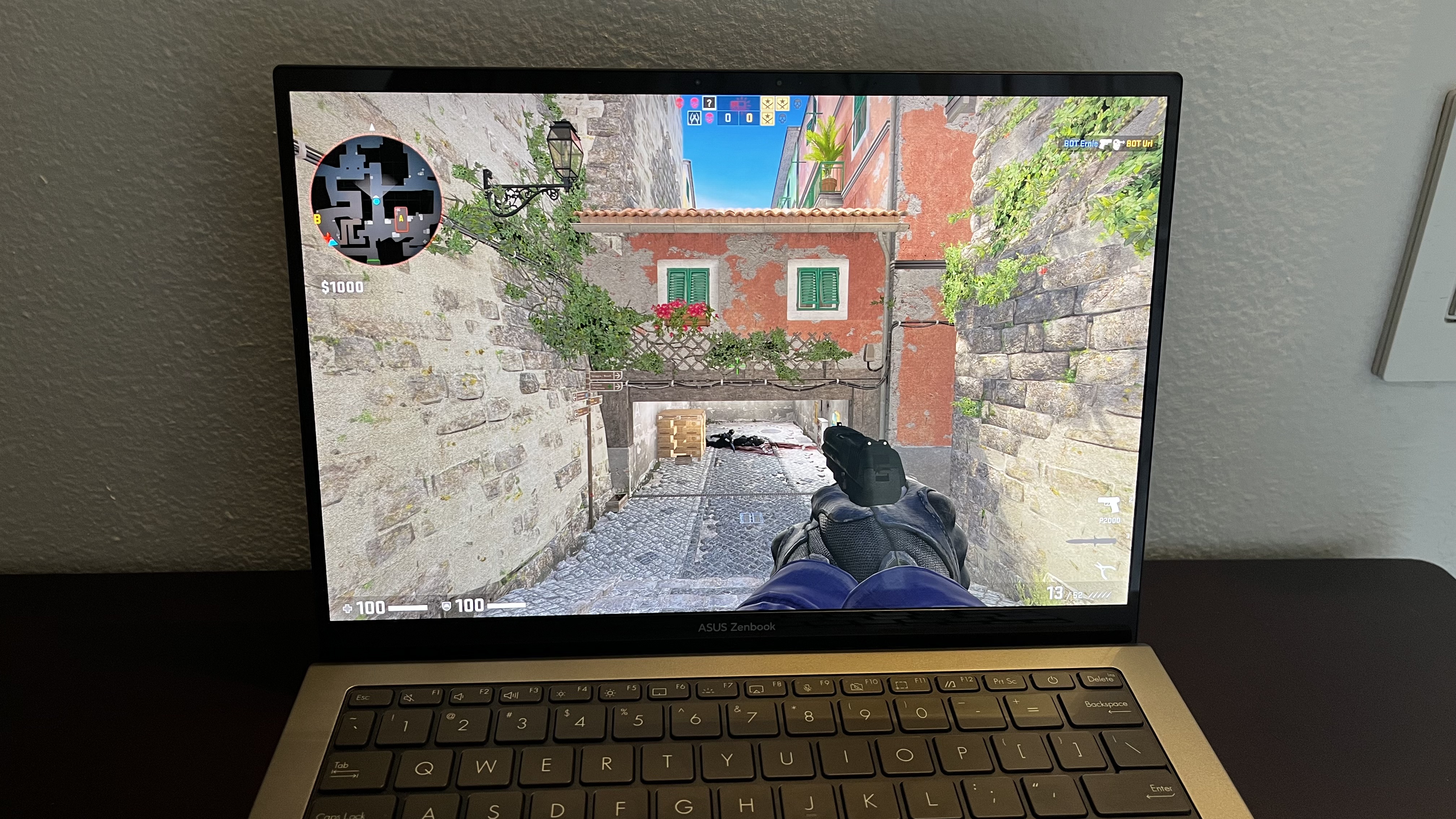
With such a fantastic display, the internals better be able to keep up - and in this little powerhouse, they certainly can. A 13th-gen Intel Core i7 and 32GB of RAM with Intel Xe graphics is robust enough for anyone that doesn’t consider themselves a capital G Gamer. I was even able to run some games on the Asus Zenbook S 13 OLED. CS:GO ran almost flawlessly with only a dropped frame here or there, while GTA IV was able to run on medium graphics. I did experience enough stuttering to find that this is the laptop’s upper limits. However, considering there’s no discrete graphics card, that’s pretty impressive. If you like to do some light gaming while traveling, this machine can definitely do that.
For a more real-world example, I was able to open 20 different tabs on Google Chrome, five of them streaming from Youtube or Netflix. I had no trouble going to any tab including the streaming ones to either click on a link or fast forward or rewind with immediate results.
As great as the performance of the Asus Zenbook S 13 OLED (2023) is, its speakers are not quite at the same level. That’s not that much of a surprise as most really, really thin laptops have crappy speakers. I have heard much worse and the speakers are serviceable – Harman Kardon did what they could do, but they’re relatively thin with no low-end. At least there’s some stereo separation for when you’re watching a movie.

The camera, which can do a lot digitally via the MyAsus app such as background blur and auto zoom, is a mostly quality inclusion. It has a 1080p resolution, IR and Hello Windows capability for sharp, clear images. However, it’s not the best at tracking as I do experience plenty of ghosting with any sudden or large movements.
Speaking of the MyAsus app, there’s a lot of fine-tuning available here from fan and battery settings to audio modes and adjustments for both the camera and the mic. If you decide to go with this little computer, don’t ignore the app.
- Performance: 4.5 / 5
Asus Zenbook S 13 OLED (2023): Battery life
- Gets 12 out of 14 hours of advertised battery life
- Boots right up when plugged in on 0%
Considering that the Asus Zenbook S 13 OLED (2023) is supposed to have a 14-hour battery life, the fact that the PCMark 10 Battery Life ran the battery down after 12 hours and 7 minutes means it doesn’t quite hit the advertised mark. That said, 12 hours is still very, very good and most computers outside of a MacBook Pro, which makes it to 15, struggle to get to that point. The aforementioned Acer Swift 3 OLED only makes it to six and half hours while another great contender among the Ultrabooks, the Lenovo Yoga 9i Gen 8, clocks in at just over ten hours.
Outside of using a Benchmark test, the Asus Zenbook S 13 OLED (2023), which I used regularly for a week, rarely needed a charge. It also didn’t seem to lose charge when sitting closed and idle as I’ve seen some laptops do. The only time the battery life was nearly empty was during that Benchmark test. Speaking of, once the battery was completely depleted, I plugged the laptop in and it booted up right away – no need for it to regain some battery.
- Battery life: 4.5 / 5
Should you buy the Asus Zenbook S 13 OLED (2023)?
Buy it if...
Don't buy it if...
Asus Zenbook S 13 OLED: Also consider
If our Asus Zenbook S 13 OLED review has you considering other options, here are two more laptops to consider...
How I tested the Asus Zenbook S 13 OLED
- I tested for a week
- I used it as my everyday computer as well as did some gaming
- I tested the various aspects and features
Having used the Asus Zenbook S 13 OLED for a week as an everyday computer, I did plenty of work on it including writing up articles (including this one). I downloaded and played some games that I thought might be within its capabilities, namely CS:GO and GTA IV. I also played some streaming videos, including Netflix’s Wednesday, to get a better sense of the screen, in particular its colors and HDR.
After a week of using this laptop, it’s clear that it’s a contender in the Ultrabook category and that it’s for anyone who might gravitate towards something thin and light, namely laptops from Apple or Dell’s XPS line.
I’ve spent the last few years reviewing tech gear for gaming and otherwise, where I’ve gotten a feel for what to look for and how to put a piece of kit through its paces to see whether it’s worth the recommendation. And, I’ve spent even longer playing computer games so I have an understanding of what gamers look for to get the most out of their titles.
First reviewed May 2023







